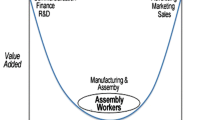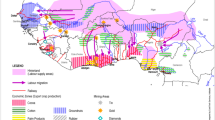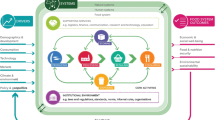Abstract
This paper advances critical Fair Trade literature by exploring reasons for and lessons from uneven and unequal lived experiences of Fairtrade certification. Fieldwork was conducted in 2007 and 2008 to explore views and develop interpretations from various actors directly and indirectly participating in a Fairtrade certified sugar organization in Malawi. By exploring an embedded social and political context in a production place, and challenging assumptions and expectations of a Fair Trade community empowerment approach, research reveals intended and unintended consequences since certification. Findings propose lessons to adopt more nuanced understandings of place and context in Fair Trade approaches to facilitate more balanced community empowerment outcomes.

Similar content being viewed by others
Notes
Fair Trade, as used in this paper, refers to a broader trade justice and development movement pioneered by Fair Trade Organizations that incorporates a wider range of products, campaigning and awareness raising activities. Fairtrade is a certification and labelling system governed by FLO and FLO-Cert to certify products that carry the Fairtrade Mark.
Material from doctoral research funded by the ESRC and collaboration between (will be completed upon acceptance).
Local government districts in Malawi are subdivided into Traditional Authorities governed by chiefs. In many ways traditional structures in rural society in Malawi exist in parallel with national and local government administrative structures. TA leaders, for instance, govern access to customary land and associated rights to cultivate on that land.
Intended to be effective from October 2015.
I. Parrott, personal communication 10 June 2008, and B. Namata, personal communication 27 September 2007.
There are other aims related to the environment that are not relevant to this study.
Situation at the time of research, since under review by the FLO and FTOs.
As indicated earlier in the paper, this was amended to invite two employees into the committee.
Abbreviations
- ACP:
-
African Caribbean Pacific
- CSA:
-
Cane Supply Agreement
- DOP:
-
Division of proceeds
- EU:
-
European Union
- FLO:
-
Fairtrade Labeling Organizations International
- FSP:
-
Fairtrade Social Premium
- FTO:
-
Fair Trade Organization
- GAP:
-
Good Agricultural Practice
- GPN:
-
Global Production Networks
- GVC:
-
Global value chain
- KCGL:
-
Kasinthula Cane Growers Limited (in Malawi)
References
Amin, A. 2001. Moving on: Institutionalism in economic geography. Environment and Planning A 33: 1237–1241.
Arce, A. 2009. Living in times of solidarity: Fair Trade and the fractured life worlds of Guatemalan coffee farmers. Journal of International Development 21(7): 1031–1041.
Bacon, C. 2004. Confronting the coffee crisis: Can Fair Trade, organic, and specialty coffees reduce small-scale farmer vulnerability in northern Nicaragua? World Development 33(3): 497–511.
Bedford, A., M.E. Blowfield, D.G. Burnett, and P. Greenhalgh. 2002. Value chains: Lessons from the cocoa and tea sectors. Greenwich: NRI.
Berlan, A. 2008. Making or marketing a difference? An anthropological examination of Fair Trade cocoa from Ghana. Research in Economic Anthropology 28: 171–194.
Bolwig, S., S. Ponte, and A. du Toit. 2008. Integrating poverty, gender, and environmental concerns into value chain analysis. Copenhagen: Danish Institute for International Studies, DIIS working paper no. 2008/16.
Casson, M.C., M.D. Giusta, and U.S. Kambhampati. 2010. Formal and informal institutions and development. World Development 38(2): 137–141.
Coe, N., and M. Hess. 2007. Global production networks: challenges and debates. GPERG workshop University of Manchester, 25–26 January 2007. http://www.sed.manchester.ac.uk/geography/research/gpe/downloads/Manchester_Jan07_positionpaper_final.pdf. Accessed 11 Feb 2009.
Coe, N.M., P. Dicken, and M. Hess. 2008a. Global production networks: Debates and challenges. Journal of Economic Geography 8: 267–269.
Coe, N.M., P. Dicken, and M. Hess. 2008b. Global production networks: Realizing the potential. Journal of Economic Geography 8: 271–295.
Cumbers, A., C. Nativel, and P. Routledge. 2008. Labor agency and union positionalities in global production networks. Journal of Economic Geography 8: 369–387.
Daviron, B., and S. Ponte. 2005. The coffee paradox. London: Zed Books Ltd.
DEFRA. 2006. Reform of the EU sugar regime. London: DEFRA.
DFID 1999. Sustainable livelihoods guidance sheets. http://training.itcilo.it/decentwork/staffconf2002/presentations/SLA%20Guidance%20notes%20Section%202.pdf. Accessed 17 July 2007.
Dolan, C. 2010. Virtual moralities: The mainstreaming of Fairtrade in Kenya tea fields. Geoforum 41(1): 33–43.
Dolan, C. 2008. In the mists of development: Fairtrade in Kenyan tea fields. Globalizations 5(2): 305–318.
Eberhart, N. 2006. Summary of the Fair Trade impact study concerning small farming organizations and families and their lands in the Yungas coffee region, Bolivia. Lyon: AVSF.
FLO. 2009a. A charter of Fair Trade principles. http://www.fairtrade. net/fileadmin/user_upload/content/2009/about_us/documents/Fair_Trade_Charter.pdf. Accessed 15 Sept 2009.
FLO. 2009b. Generic Fairtrade standards for small producers’ organizations. http://www.fairtrade.net/fileadmin/user_upload/content/2009/standards/documents/Aug09_EN_SPO_Standards.pdf. Accessed 15 Sept 2009.
Getz, C., and A. Shreck. 2006. What organic and Fair Trade labels do not tell us: Towards a place-based understanding of certification. International Journal of Consumer Studies 30(5): 490–501.
Henderson, J., P. Dicken, M. Hess, N. Coe, and H.W.-c Yeung. 2002. Global production networks and the analysis of economic development. Review of International Political Economy 9(3): 436–464.
Hickey, S., and G. Mohan. 2004. Participation: from tyranny to transformation? Exploring new approaches to participation in development. London: Zed.
Hudson, R. 2005. Economic geographies: Circuits, flows and spaces. London and Thousand Oaks, CA: SAGE Publications.
Hughes, A. 2005. Geographies of exchange and circulation: Alternative trading spaces. Progress in Human Geography 29(4): 496–504.
Hughes, A. 2001. Global commodity networks, ethical trade and governmentality: Organizing business responsibility in the Kenyan cut flower industry. Transactions of the Institute of British Geographers 26(4): 390–406.
Humphrey, J. 2005. Shaping value chains for development: Global value chains in agribusiness. Frankfurt: GTZ.
Illovo. 2008. World of sugar 2008. http://www.illovosugar.com/ World_of_sugar/WorldSugarPricesandUpdates.aspx. Accessed 23 March 2009.
Jaffee, D. 2007. Brewing justice. Berkeley and Los Angeles: University of California Press.
Jessop, B. 2001. Institutional re(turns) and the strategic-relational approach. Environment and Planning A 33: 1213–1235.
Lacey, S. 2009. Beyond a fair price: The co-operative movement and Fair Trade. Manchester: Co-operative College, Paper 14.
Leslie, D., and S. Reimer. 1999. Spatializing commodity chains. Progress in Human Geography 23(3): 401–420.
Luetchford, P. 2008. The hands that pick fair trade coffee: Beyond the charms of the family farm. Research in Economic Anthropology 28: 143–169.
Luiz, J.M. 2009. Institutions and economic performance: Implications for African development. Journal of International Development 21: 58–75.
Luttrell, C., S. Quiroz, C. Scrutton, and K. Bird. 2007. Understanding and operationalizing empowerment. Berne, London: SDC, ODI.
MacLeod, G. 2001. Beyond soft institutionalism: Accumulation, regulation, and their geographical fixes. Environment and Planning A 33: 1145–1167.
Martin, R. 2003. Institutional approaches in economic geography. In A companion to economic geography, ed. E. Sheppard, and T. Barnes, 77–94. Oxford: Blackwell Publishers.
Mayoux, L. 2001. Impact assessment of Fair Trade and ethical enterprise development. EDIAIS paper. http://www.sed.man.ac.uk/research/iarc/ediais/pdf/IAofFairTrade.pdf. Accessed 1 Dec 2005.
Mendez, V.E. 2002. Fair Trade networks in two coffee cooperatives of western El Salvador. Fort Collins: Colorado State University.
Morrison, J., A. Dorward, J. Kydd, C. Poulton, and L. Smith. 2000. Sustainable livelihoods and new institutional economics. http://www.livelihoods.org/PIP/pip/nieint.html. Accessed 24 July 2007.
Murray, D.L., L.T. Raynolds, and P.L. Taylor. 2006. The future of Fair Trade coffee: dilemmas facing Latin America’s small-scale producers. Development in Practice 16(2): 179–192.
Murray, D.L., L.T. Raynolds, and P.L. Taylor. 2003. One cup at a time: Poverty alleviation and Fair Trade coffee in Latin America. Fort Collins: Colorado State University.
Neilson, J., and B. Pritchard. 2009. Value chain struggles: institutions and governance in the plantation districts of South India. Chichester, West Sussex, England, and Malden, MA: Wiley-Blackwell.
Nicholls, A., and C. Opal. 2005. Fair Trade: Market-driven ethical consumption. London: Sage.
North, D. 1991. Institutions. Journal of Economic Perspectives 5(1): 97–112.
NSO. 2006. Malawi international merchandise trade statistics http://www.nso.malawi.net/data_on_line/economics/Trade%20on%20NSO%20website/Trade_Index.html. Accessed 4 March 2009.
Philo, C., and H. Parr. 2000. Institutional geographies: Introductory remarks. Geoforum 31: 513–521.
Pinder, C. 2004. Economic pathways for Malawi’s rural households. London: CARE Malawi.
Prieto, M., C. Seeley, and D.F. Murphy. 2004. Supply chain codes of conduct and Fair Trade initiatives. Chapter 13, Trade and gender: Opportunities and challenges for developing countries. New York: United Nations.
Raynolds, L.T. 2004. The globalization of organic agro-food networks. World Development 32(5): 725–743.
Raynolds, L.T. 2002. Poverty alleviation through participation in Fair Trade coffee networks: existing research and critical issues. Background paper prepared for project funded by the Community and Resource Development Program, The Ford Foundation, New York.
Raynolds, L.T., D. Murray, and J. Wilkinson. 2007. Fair Trade. London and New York: Routledge.
Richardson, B. 2009. Restructuring the EU-ACP sugar regime: Out of the strong there came forth sweetness. Review of International Political Economy 16(4): 673–679. iFirst: 1–25.
Ronchi, L. 2002. The impact of Fair Trade on producers and their organizations. University of Sussex, PRUS working paper no. 11.
Ruben, R., R. Fort, and G. Zúñiga-Arias. 2009. Measuring the impact of fair trade on development. Development in Practice 19(6): 777–788.
Sen, A.K. 1999. Development as freedom. New York: Knopf.
Shreck, A. 2005. Resistance, redistribution, and power in the Fair Trade banana initiative. Agriculture and Human Values 22: 17–29.
Slob, B. 2006. A fair share for smallholders: A value chain analysis of the coffee sector. Amsterdam: SOMO.
Tallontire, A. 2000. Partnerships in fair trade: Reflections from a case study of Cafedirect. Development in Practice 10(2): 166–177.
Tallontire, A.M., M. Opondo, V. Nelson, and A. Martin. 2011. Beyond the vertical? Using value chains and governance as a framework to analyze private standards initiatives in agri-food chains. Agriculture and Human Values 28: 427–441.
Taylor, P.L., D. Murray, and L.T. Raynolds. 2005. Keeping trade fair: Governance challenges in the Fair Trade coffee initiative. Sustainable Development 13: 199–208.
UNICEF. 2006. The Malawi social cash transfer pilot scheme, preliminary lessons learned. http://www.unicef.org/policyanalysis/files/The_Malawi_Social_Cash_Transfer_Pilot_Scheme__Preliminary_Lessons_Learned.pdf . Accessed 2 May 2008.
Acknowledgments
I am grateful to the countless number of people in Malawi who participated in and supported this research. This includes research participant members of Kasinthula Cane Growers Limited and the Chikwawa district who welcomed me into their community and offered significant time and effort to share their experiences, opinions, and concerns. It is from that information that all of this work has been built upon and would not have been possible otherwise. My gratitude extends to Jason Agar and associates of Kadale who kindly hosted me in Blantyre and provided priceless advice and support. Also thanks to the research assistants for their excellent work with me in the field and for their friendship. Funding for this research was provided by the Economic and Social Research Council (ESRC Studentship PTA-033-2006-00041). The selection of the case study, research proposal, and funding for research were secured through collaboration between Newcastle University and Traidcraft Plc.
Author information
Authors and Affiliations
Corresponding author
Rights and permissions
About this article
Cite this article
Phillips, D.P. Uneven and unequal people-centered development: the case of Fair Trade and Malawi sugar producers. Agric Hum Values 31, 563–576 (2014). https://doi.org/10.1007/s10460-014-9500-z
Accepted:
Published:
Issue Date:
DOI: https://doi.org/10.1007/s10460-014-9500-z




